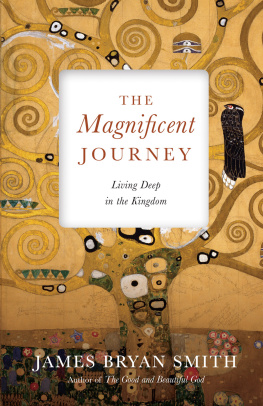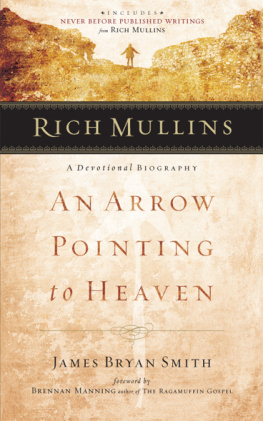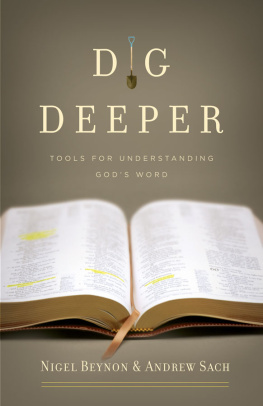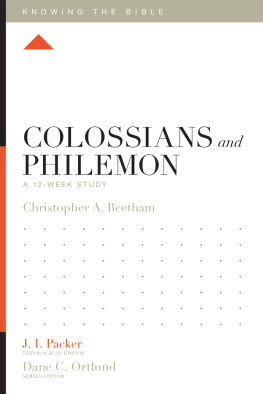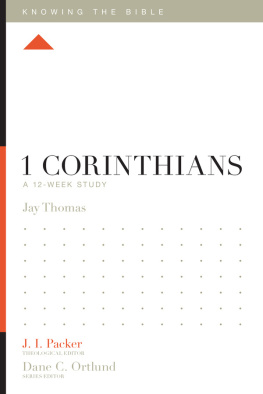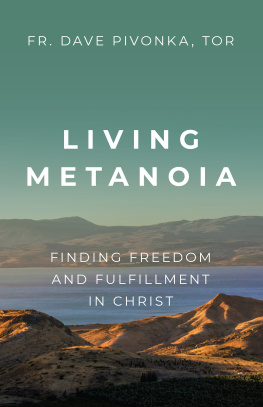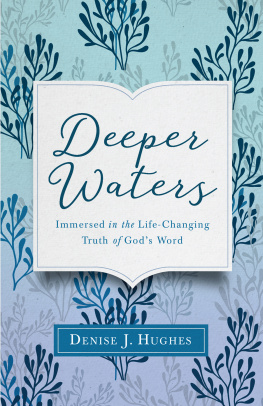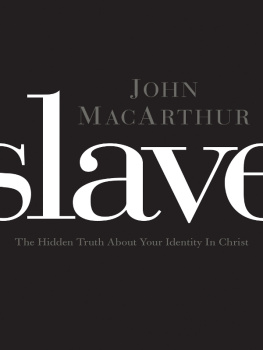I would like to thank my wife, Meghan, who had a vision for this book before I began. Her enthusiasm was contagious. She also read each chapter carefully and gave excellent feedback for each one.
I would also like to thank the people of Chapel Hill United Methodist Church in Wichita, who shared their insights into Colossians 3 over the past few years. Many of them found their way into this book.
Many thanks to my father-in-law, Emil Johnson, who proofread the final edition of this bookand thanks to his grammar teachers who taught him well.
Finally, I would like to thank InterVarsity Press, particularly Cindy Bunch and Jeff Crosby, who are the very best at what they do.
Introduction
Sanctify them by the truth; your word is truth.
J OHN 17:17
C olossians 3 has changed my life.
In 2002, I began memorizing Colossians 3:1-17. When you memorize a passage rather than a random verse here or there, your mind is filled with an entire system of thought, not merely an idea. Colossians 3 is a very rich passage, comprising a complete picture of our life in Christ, so it made an ideal choice to memorize.
It takes me a while to memorize a passage. I printed a few verses on a note card and carried it with me everywhere I went. I said it over and over in the morning, and throughout the day. Each night I fell asleep reciting as many verses as I could. In about a month or two I had it memorized. I continued to recite it as often as I could each day, and soon the ideas and images in the passage began to permeate my thoughts. Each day, I found a new application for some part of the passage.
A few years later I gathered a group of twenty-five people to field-test a curriculum I was creating, called the Apprentice series, to teach us how to develop Christlikeness. Knowing how powerful memorizing this passage had been for me, I asked everyone in the class to do the same. No one objected, though a few people told me initially they were certain they could not do it. I told them they could if they broke it down, verse by verse. After a month or so everyone in the class could recite Colossians 3:1-17. Over the next six months we went through the material and the exercises found in the series. In nearly every class session someone would make a reference to Colossians 3. They would say things like, The other day I was thinking about how my life in Christ has changed, and I thought about that image of changing clothes in Colossians 3:12, about how I have taken off things like anger and put on things like compassion.
Over the next four years I would ask each new group who went through the curriculum to memorize this text. All in all, over a hundred people went through the curriculum and memorized Colossians 3, and each of them shared some new insight into the passage I had never seen before. Now, ten years later, this passage is even more fascinating for me than when I began.
One of the things you notice when you memorize a passage is that single words stand out. In the classes we found ourselves saying, Why does Paul say Jesus is seated at the right hand of God in verse 1? Does that word matter? It must, because Paul never wasted words. So, what does it mean? What does it mean in my life?
Jesus is called the Logos in the first chapter of Johns Gospel. Logos is the Greek word for Word. John is telling us that Jesus is the Word of God who became flesh. One day it hit me: just as the Word became flesh in Jesus, so also our flesh becomes a word. The words in Colossians 3 have become enfleshed in my life.
Words are powerful. We are shaped by words. Words contain ideas, and they shape the way we see God, ourselves and all of reality. Single words from Colossians 3 began to bounce around in my mind, forming a new understanding of the gospel, a new awareness of who I am, and who my brothers and sisters in Christ are. I began to love the words in this passage:
- raised
- hidden
- wrath
- knowledge
- affections
- peace
- gratitude
- name
As I probed into these single words, they began to yield a deeper understanding of what it means to be an apprentice of Jesus. I found them to be a kind of corrective to many of my false ideas.
Examining the word hidden , for example, opened up a whole new understanding of our life in Christ. I knew from Romans 6 that those of us who have been baptized into Christ have died, were crucified with Jesus and raised with him. But in Colossians 3:3 Paul tells us that this new life in Christ is hidden with Christ in God. I had no idea what this mystery meant, but as I began to delve deeper into this word (and parallel passages) a new understanding of what it means to have my life hidden in Christ emerged, and with it a deeper gratitude to God and a more solid confidence in Jesus than ever before.
My aim in this book is to take you on this journey with me. I tried, in each of the thirty chapters, to bring out the rich insights each word had provided for me. The goal here was not to excavate some scholarly insights, but to bring forth the main truth of the word or phrase in such a way that you, the reader, will find encouragement, refreshment and enthusiasm. Paul wrote his letter to the Colossians not to give them an academic treatise on Christian theology but to tell his readers a storythe greatest story the world has ever heard. It is a story about love, self-sacrifice, new life, victory over evil, transformation, compassion, forgiveness and glory. It is the story of the extravagant love of the Trinity, who engaged in a divine conspiracy to redeem, reconcile, forgive, heal and draw all people into an intimate relationship of love.



